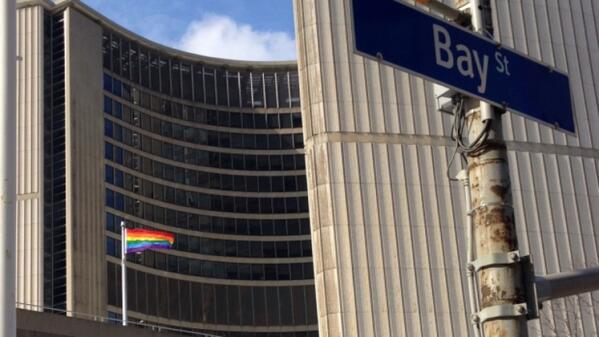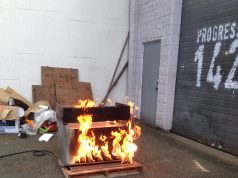People demand freedom of speech as a compensation for the freedom of thought that they seldom use.
— Soren Kierkegaard (@SorenKQuotes) January 28, 2014
Events of this past week – which I’m naming “This Ontario Week in Sochi Canada” – brought to mind a moral question beautifully crystallized in @praxistheatre’s production of Rifles. In the play, a fierce woman fights to maintain and pass on the power of her moral compass to her family. In a harrowing moment when the woman discovers that yet another family member has been taken she loses her fight and picks up the very tools used to bludgeon her in the first place. She becomes one of “them”, the faceless enablers of atrocity. She becomes the user of rifles. It made me wonder, what would I resort to if I were stripped of the ideas and communities that ground me in my world? She fails, would I?
It is with this in mind that I tackle two moments in this week that was where the democratization – for better or worse – of media was in full bloom.
First, there was the slurpee-sized moment when mayor Rob Ford attempted to block the city of Toronto from joining an international protest against Russia’s homophobic policies by flying the Pride Flag at City Hall. What fun! How current! A great doctored shot of him riding naked on a horse with Putin made the Twitter Party Circuit. Slurp, snort, Brain-freeze! Ford lost his battle-of-the-flag and much of the win can be attributed to a simultaneous counter offensive afforded us through a more democratized media. So the day was won, in part, due to our individual ability to respond to a big bomb with a million tiny pistols.
Fantastic! But it seems like everybody is sharing being overwhelmed by the power of “the status quo” (often misattributed as synonymous with free speech). Enter (again) Rob Ford and his brother Doug, taking to the democratized airwaves with their own YouTube Show. Democratization of Western media means – basically–that everyone is doing it. (Or can)
Next up was the @CBCOntarioToday phone-in show called “Is live theatre dead to you?” I finally turned my attention to the podcast when I read about a petition started by @GoodOldNeonTO. It was the petition that actually got me to listen, not the good natured tweets before and during its airing: conflict in life, like in drama, being the hook.
The out of the gates response from my Twitteratti was about the dumbed down conversation and the problematic frames used for engaging with the topic. I will disclose here that I have not signed the petition.
What I did do – quite uncharacteristically – was take to Twitter with a list of reasons for why I liked the show. In addition to my Twitter list I liked the binary, or the simplistic, or the reductive framing because it allowed the space to hear things that I think are valuable to hear. I liked hearing about the barriers to going to theatre and felt that the general tenor of the show did allow for conversion. And I loved hearing that someone thought there would be real cats in Cats. Why? Because that is no less strange (or less imaginative) than the wonderful Daschund UN that @WorldStageTO and @FTAMontreal treated Canadians to last year. I would have been really bummed if I had turned up to find humans in dog suits at that show.
But there were two things that I did not enjoy and these connect back to Rob Ford’s Phobic Pride Flag debacle.
The first was the evident fear of art. The concern that art’s end-game is a kind of corruption seemed to seep through what I can only assume was a well-intentioned desire to celebrate a bold move by Brendan Healy, Artistic Director of Buddies in Bad Times Theatre, when last year he made a bold inquiry (paraphrased here): “Why, please tell me, are you not coming to my theatre?” Strange then to feel that answers to his question were formulated before the first caller hit the air. There was an indication from the show (and refuted point-for-point on the petition page (referred to above) that people don’t go to theatre because they are too busy going elsewhere (a spurious argument). Moreover, that to go to the theatre requires “erudition” (oh please Rita, really?) or an appetite for being ripped off.
None of this really bothered me. I enjoy this kind of easy-breezy “this bugs me and that bugs me” kind of deal. What did bother me was the underlying sensibility that phobia is a basic lens through which all discussion of art and sexuality must be seen.
There appears to be an ergo that now links an expression of the unknown with the engenderment of fear in the hypothetical audience member. If you listen to the show you will encounter a vivid description of entrapment whereby a man and his wife, unsuspecting victims of American commercial art, were lured into a house of ill repute, and their very souls were drained of life force in fact made them feel murderous. I was so relieved they got out of there alive and held my breath ‘til story’s end for fear that he might have died at the hands of this awful, awful theatre experience! I exaggerate and the above is sarcastic, the lowest form of something, but the story was woven through with the basic presumption that the unknown is always a trap.. The actual story starts the show at 2:48 on the podcast.
The phobia continued into new terrain with Buddies In Bad Times Theatre being referred to as “a professional company in Toronto…” – What is professional? Please will somebody tell me so that I can tell other people? – without ever mentioning its Queer status. Was this a “gift” from the mother corps to Buddies? Here ya go! Here’s your hard fought for legitimacy? Or was it to ensure that the CBC would not offend homophobic listeners and therefore – so the story goes – further diminish their listening base? God I hope neither is true, but after This Ontario Week in Sochi Canada it is hard not to go there.
Earlier I asked what I would become if I, like the protagonist in Rifles, lost my markers of self. I think that it might be choosing to hate those that hate me. How can I arm myself against this? I don’t want to fail at this.










